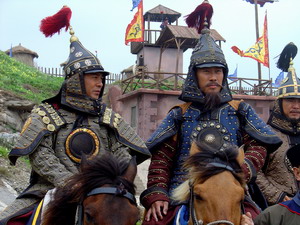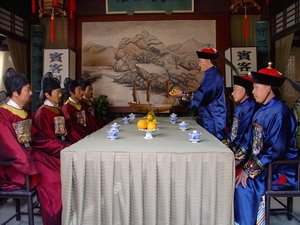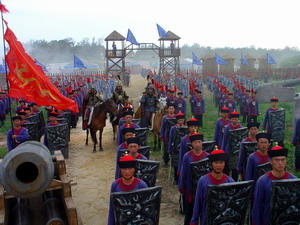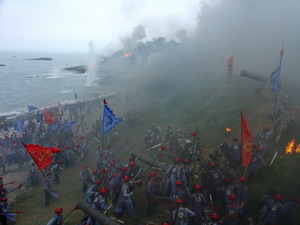The Great General Shi Lang
On the national television network CCTV in China, the most popular programs are the prime-time historical serial dramas. There are a large number of possible historical subjects; for each subject, there are also a large number of possible positioning. Therefore, what actually shows up on television is by careful design and not by accident. Specifically, the general expectations are that the actual realized dramas will serve purposes of modern political propaganda.
On March 27, CCTV began a 37-episode broadcast of the drama titled "The Great General Shi Lang."
The background is the pacification of Taiwan during the reign of the Qing dynasty emperor Kang Xi. According to China National Radio, the drama "describes how the patriotic general Shi Lang successfully completed the unification of the country and artistically presented the heroic deeds of General Shi Lang in pacifying Taiwan and realizing national unification." The following photographs show that we can expect another one of those clunky historical costume dramas.




Under the present media environment in China, it is probably unlikely that any mainstream media (such as newspapers) will directly criticize this television drama series. But the Internet is a different matter. The following is a widely disseminated BBS forum post (via 163.com).
Presently, there are some twists and turns in the cross-strait relationships. Some people are talking about how Shi Lang recovered Taiwan and praising the history of the unification of China/Taiwan under the Manchurian Qing dynasty. They are hoping the past can be used as an analogy to be applied to the present. This writer believes that this type of propaganda is incorrect, both with respect to the past and the present. The negative consequences are not negligible, and so we must pay attention.
1. This is inconsistent with the historical facts
1. The true interest of the Manchurian Qing dynasty in Taiwan was not about unifying the motherland. The Zheng family in Taiwan held the Ming Dynasty as the mainstream (that is, heaven's mandate). They used the Ming Dynasty calendar, they wore Chinese-style clothing and so they were not Taiwanese separatists who have forgotten about their ancestry. When the two sides sat down to discuss national unification (see the top right photograph), the Zheng family made the proper demand of "no head-shaving" but the Manchurians refused. Thus, war began. After the Manchurians conquered Taiwan, the Emperor Kang Xi believed that "Taiwan is overseas territory and does not matter" (台湾属海外地方,无甚关系) and there is "no gain if we get it and no loss if we don't get it" (得之无所加,不得无所损). A minister even said "let's vacate the land for the barbarians to live there" (空其地任夷人居之) and advocated "presenting it as a gift" to the Dutch! This revealed the true motive why the Manchurians invaded Taiwan: even if they cede Taiwan to the foreigners, they would never tolerate the existence of a government of the Han people there. They didn't care if Chinese territory was integral, as long as no one threatened them in their own realm! ...
2. The Zheng family were the only people responsible for the recovery of Taiwan. Although the Ming army under Zheng Chenggong was a ragged bunch, they built a powerful navy in the manner of the west and that was how they defeated the Dutch and set the first example of the Chinese defeating a western power. Zheng Chenggong and Zheng Jing took Taiwan back, set up a system of local governments, developed agriculture and popularized education. Faced with the economic blockage by the Qing Dynasty, they actively developed marine trade and accumulated huge amounts of riches so that Taiwan truly became the island of treasures. Even the Manchurian ministers had to admit: the remnants of the Ming dynasty in the form of the Zheng family were not just bandits. Conversely, the Manchurians military had no idea how to conduct sea battles and they would have faced disaster in such a war. That would have meant that Taiwan could never be taken back and it would become the point of contention among Holland, Spain, England, France and America, and there will never be peace on mainland China either. Of course, Shi Lang had his historical contributions through arguing successfully against others for the Manchurian dynasty not to abandon Taiwan. But the principal contributions came from the Zheng family.
2. It does not help to solve the current problem
At this moment, the divergence between the shores of the strait is turning from the realm of ideology to the realm of nationalist and cultural identities. This tells us that the Taiwan problem is not just the result of the Communist-KMT civil war, but it goes all the way back to the 1894 Sino-Japanese war or even the transition between the Ming and Qing dynasties. Therefore, we must be extra-sensitive about the historical appraisal of Zheng Chenggong and Shi Lang.
1. This causes the people of Taiwan to be unhappy. Zheng Chenggong is Fujianese. Fujian and Taiwan have been one family since ancient times, and Zheng Chenggong is the pride of the Taiwanese. The Taiwanese respect Zheng Chenggong and Zheng Jing for recovering and developing Taiwan, and they are known as the "sacred kings who developed Taiwan." There are 150 temples around the island in honor of him. Denigrating the Zheng family would seriously hurt the feelings of the Taiwanese people. Conversely, the Manchurian dynasty ceded Taiwan to Japan after the 1894 Sino-Japanese war, and the Taiwanese say that the Manchurians sold out Taiwan.
2. This will be made use of by the Taiwan independence elements. At the present, mainland China proposes that as long as the principle of One China is upheld, peace and stability can exist across the straits. The Taiwan independence forces want to achieve the goal of separation and they actively create ethnic divisions and denigrate China. Under these circumstances, it is extremely inappropriate to compare mainland China with the Manchurian dynasty and Taiwan with the Zheng family.
(1) This will be used to attack the Chinese policy for Taiwan. Presently, the people of Taiwan only have a fuzzy idea of Chinese policies towards Taiwan, but the history of Shi Lang's pacification of Taiwan is well-known. Psychologists have shown by experiments that people often have extreme psychological reactions to lively and vivid information and therefore create a wrong impression that will increase mutual mistrust. Since the Taiwan independence forces control public opinion, they may use this to suggest that mainland China intends to conquer Taiwan by force, and so the people must not be fooled and they must purchase American weapons to protect themselves.
(2) This will be used to attack Chinese civilization. At presently, the Taiwanese independence forces is promoting the "de-Sinofication" process. Within the textbooks, they list Chinese history after the Ming Dynasty under world history. If we promote Shi Lang every day, the Taiwan independence forces will say that mainland China is still prettifying the history of the Manchurians enslaving the Chinese. "They are overlooking the civilization of the Han and Tang dynasties, but they dwell with great relish on the days of "wearing a pig tail" as slaves. Since Chinese civilization is beyond salvation, we must become independent in order to rid ourselves of this degenerate civilization and enter into the ranks of developed countries such as the United States and Japan." This is benefiting the Japanese ghouls. It is worth mentioning that the mother of Zheng Chenggong is Japanese and he was born in the Japanese history of Nagasaki. The Japanese treat Zheng Chenggong as their national hero, with a famous drama about Zheng Chenggong taking back Taiwan. The fantasy of the Japanese is to treat Zheng Chenggong as their own national hero in order to take over Taiwan. If we denigrate the Zheng family, it would be heaven-sent for the Japanese! They would then link up with the Japanese-loving Taiwan independence elements, and inject more complexities for the Taiwan problem.
Based upon the above, at a critical moment in the twists of cross-strait history, we ought to give up speaking about how Shi Lang took Taiwan back and praising how the Manchurian Qing dynasty unified China. This can only create more distance between Taiwan and mainland China, and isolate the unification proponents in Taiwan.
Here are the personal comments of the ESWN blogger:
Okay, perhaps there is one important point missing here. The people in Taiwan will not get a chance to watch this television serial drama, and neither will the people of Hong Kong. This is not necessarily just a political decision, because the show would not make it on commercial or aesthetic grounds only. A discussion such as the above is important for various other reasons, such as a greater awareness of the crass and ineffective attempt at propagandization within a popular cultural program. Of course, that was not what the producers have in mind ...